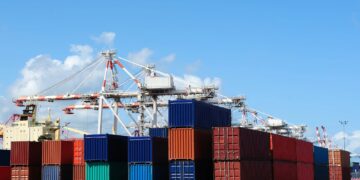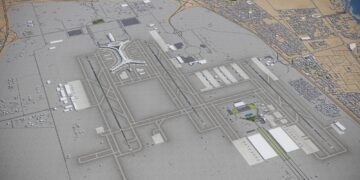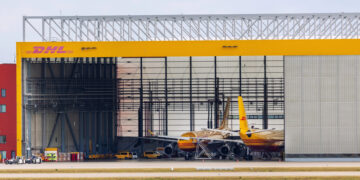The logistics sector stands at a pivotal crossroads, influenced by technological advancements and shifts in market demands. As we navigate through 2024, pinpointing the areas where organizations intend to allocate resources is crucial for anticipating emerging patterns within the industry.
A recent survey conducted by a regional logistics publication has illuminated these strategic orientations, identifying where industry front-runners perceive the greatest value in investments for the year ahead.
Embracing technology for logistics, 55% of those surveyed in the industry have identified technology enhancements as the foremost investment priority for the near future.
This inclination underscores a transition towards digital transformation in the logistics arena, seeking to capitalize on technology as an essential element for gaining competitive edges and achieving operational superiority.
The concentration on technological innovation covers a broad spectrum, targeting various breakthroughs designed to bolster efficiency, precision, and reactivity within logistics operations. Five prominent investment domains emerge.
- Enhancement of automation and robotics is being pursued by numerous logistics entities to refine warehouse functions, cut down on errors, and curtail personnel expenses. Innovations such as automated storage and retrieval units, robotic sorting, and self-governing vehicles are becoming increasingly standard in contemporary logistics centers.
- Artificial Intelligence (AI) and Machine Learning (ML) are revolutionizing the way logistics firms predict demand, oversee inventory, and streamline routing. With these technologies, companies can better anticipate market trends, base decisions on solid data, and fortify the robustness of their supply chains.
- The Internet of Things (IoT) is leveraged to augment transparency throughout the supply chain. Sensors and interconnected apparatus provide instantaneous data on the whereabouts and status of merchandise, significantly refining tracking precision and operational clarity. This connectedness not only aids in risk mitigation but also boosts the ability to respond to supply chain interruptions.
- Investments in blockchain aim to enhance the security, openness, and efficiency of transactions within the logistics sector. Blockchain can aid in diminishing fraud, eradicating mistakes, and streamlining workflows by allowing for more secure and transparent monitoring of cargos and transactions.
- The transition to cloud-based infrastructures offers increased scalability, adaptability, and collaboration among various supply chain participants. Cloud platforms enable the fusion of diverse logistics tools and systems into a cohesive interface, ameliorating data access and decision-making procedures.
The indication of substantial technological expenditure mirrors a distinct acknowledgment within the logistics industry of the imperative to adapt to swiftly evolving technological landscapes. By remaining at the vanguard of innovation, logistics firms enhance their operational capabilities and upgrade the delivery of services and customer satisfaction.
Expanding logistical networks, with 35% of survey participants designating a significant portion of their budget to the growth of logistic networks, it’s evident that scaling operations is a high priority for the sector. This strategy is propelled by the necessity to adjust to the complexities of global supply chains and the escalating demands of e-commerce and international commerce.
Many logistics companies are branching out into new regions and markets, establishing new distribution points, warehouses, and hubs in key locations to improve access to burgeoning markets. The objective is to trim down delivery times, curtail transport costs, and augment service reach.
Infrastructure enhancements are also vital to accommodate larger quantities of goods and more intricate procedures. This includes modernizing existing facilities with improved loading docks, additional storage capacity, and sophisticated handling machinery. Moreover, the construction of specialized infrastructures, like cold storage for perishables or secure zones for valuable items, is gaining traction.
To maximize efficiency, investments are being made in intermodal transport systems that fluidly connect different transportation methods. This practice reduces handling charges, abbreviates delivery periods, and lessens environmental impacts. Better intermodal facilities and services ensure smoother handoffs between road, rail, sea, and air transit.
Expansion also entails establishing strategic partnerships with other logistics providers, technology firms, and governing bodies. Such collaborations can yield collective benefits in expertise, cost savings, and improved service offerings.
Integral to network growth is a robust emphasis on sustainability. This means pouring resources into eco-friendly technologies, optimizing routes to diminish fuel usage, and adopting sustainable warehouse and materials management practices. These initiatives not only lessen the environmental impact but also meet the growing consumer and regulatory demands for more ecological logistics operations.
Through investing in the expansion of their logistic networks, firms are not merely enlarging their operations; they are strategically situating themselves to be more nimble, responsive, and attuned to the dynamics of a swiftly evolving global market.
The insights from the survey paint a definitive picture: the logistics industry’s future is being sculpted by a strong dedication to technological innovation and network growth. As the sector progresses, these focal investment areas will likely determine the successful players in the forthcoming years. For logistics businesses, the route ahead is delineated by a harmonious blend of innovation, expansion, and an unwavering commitment to the personal touch.









